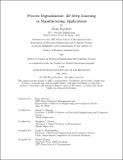Process Digitalization: 3D Deep Learning in Manufacturing Applications
Author(s)
Kochert, Ryan
DownloadThesis PDF (8.420Mb)
Advisor
Graves, Stephen C.
Boning, Duane S.
Terms of use
Metadata
Show full item recordAbstract
The surge in artificial intelligence (AI) popularity and investment has significantly impacted various sectors, including automotive, aerospace, and defense. Smaller companies at the base of these supply chains often lack the resources and knowledge for AI implementation compared to larger original equipment manufacturers, creating a unique opportunity for these smaller companies to leverage AI for growth. However, many AI initiatives in these smaller firms stall at the prototyping phase. This research outlines, from planning to execution, steps and considerations for implementing an AI initiative at a small to medium sized manufacturing company. As well, given the importance of 3D data in the industry, the research also conducts a deep dive on working with, analyzing, and integrating 3D data into an AI model using various techniques, from statistical analysis to 3D deep learning. Discussion on the different
data representations including point clouds, voxels, polygon meshes, depth maps, and boundary representations, and their trade-offs help with the determination of which representation is best for different use-cases. Most of the techniques apply to various unstructured data types to enable multi-modal inputs to a descriptive, predictive, or prescriptive AI model. Additionally, beyond the technical requirements, an entire section is dedicated to discussing the human element in this whole process, focusing on a company’s personnel and cultural aspects, which is often where initiatives can succeed or fail.
Date issued
2024-05Department
Massachusetts Institute of Technology. Department of Electrical Engineering and Computer Science; Sloan School of ManagementPublisher
Massachusetts Institute of Technology